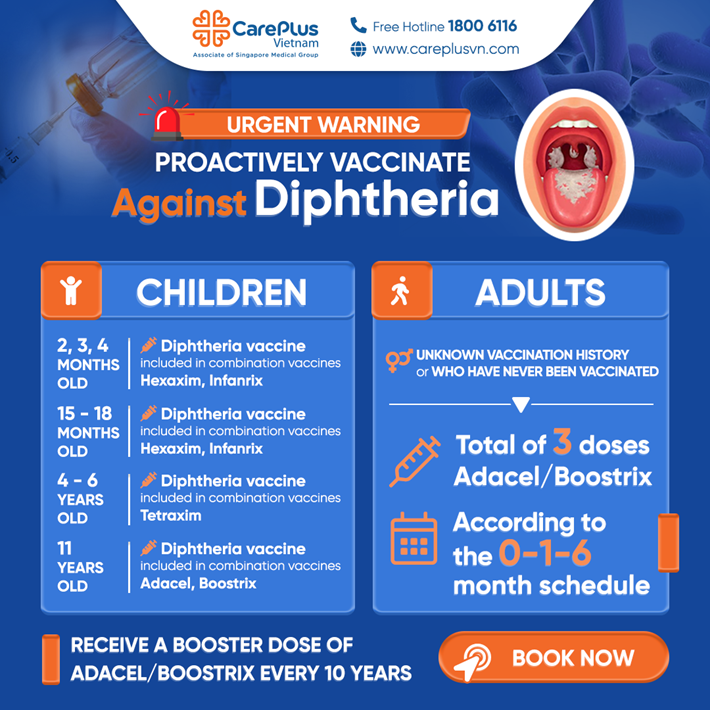DO NOT BE COMPLACENT ABOUT DIPHTHERIA: URGENT WARNING ABOUT THE RISK OF AN OUTBREAK
Recently, diphtheria has made a concerning return in Vietnam, with new cases reported and the potential for an outbreak looming. It is crucial to understand this disease and the importance of vaccination to protect public health.

7/10/2024 8:51:57 AM
Symptoms and Severe Complications of Diphtheria
Diphtheria is an infectious disease caused by bacteria that produce toxins. It spreads through respiratory droplets when an infected person coughs or sneezes. Some individuals may not show symptoms but can still transmit the bacteria to others. Others may develop mild symptoms, though severe complications and death can occur.
Symptoms of diphtheria typically appear 2-5 days after exposure to the bacteria and include sore throat, fever, swollen neck glands, and weakness. Within 2-3 days of infection, dead tissue in the respiratory tract forms a thick, gray coating that can cover the tissues in the nose, tonsils, and throat, making it difficult to breathe and swallow.
The severe complications of diphtheria are primarily due to the toxin it produces, leading to conditions such as myocarditis and nerve damage. For those who are unvaccinated and not adequately treated, diphtheria can be fatal in about 30% of cases, with children under 5 years old being at higher risk.
Who is at Risk?
Anyone without immunity (unvaccinated or not fully vaccinated) can contract the disease. In recent years, outbreaks have occurred due to insufficient vaccine coverage.
Over the past decade, diphtheria has sporadically appeared in central Vietnam, the Central Highlands, and northern provinces like Ha Giang, Dien Bien, and Thai Nguyen—areas with limited access to vaccines and low vaccination rates. The most recent case, recorded on July 8, 2024, resulted in a fatality in Bac Giang.
Proactively Vaccinate Against Diphtheria
Given the current risk, it is essential to take proactive measures by vaccinating yourself and your loved ones. Especially during this summer, ensure you are vaccinated to travel safely and avoid contracting diphtheria. Below is the recommended vaccination schedule for children and adults:
Diphtheria Vaccination Schedule
Diphtheria can be prevented with a vaccine that is often combined with tetanus and pertussis vaccines. The World Health Organization (WHO) recommends a total of six doses of diphtheria-containing vaccines, starting at 6 weeks of age through adolescence, for long-term protection.
-
Childrens 2, 3, 4 months old: Diphtheria vaccine included in combination vaccines (Hexaxim, Infanrix).
-
Childrens 15-18 months old: Diphtheria vaccine included in combination vaccines (Hexaxim, Infanrix).
-
Childrens 4-6 years old: Diphtheria vaccine included in combination vaccines (Tetraxim).
-
Childrens 11 years old: Diphtheria vaccine included in combination vaccines (Adacel/Boostrix).
Additionally, adults should receive a booster dose of Adacel/Boostrix every 10 years. For adults with unknown vaccination history or who have never been vaccinated, a total of three doses of Adacel/Boostrix should be administered according to the 0-1-6 month schedule.
To protect yourself and the community, schedule your vaccination with the CarePlus Clinic system through the free hotline 18006116 or contact via the CarePlus Clinic Vietnam Facebook page. Vaccination not only helps you avoid diphtheria but also protects those around you, especially young children and the elderly.